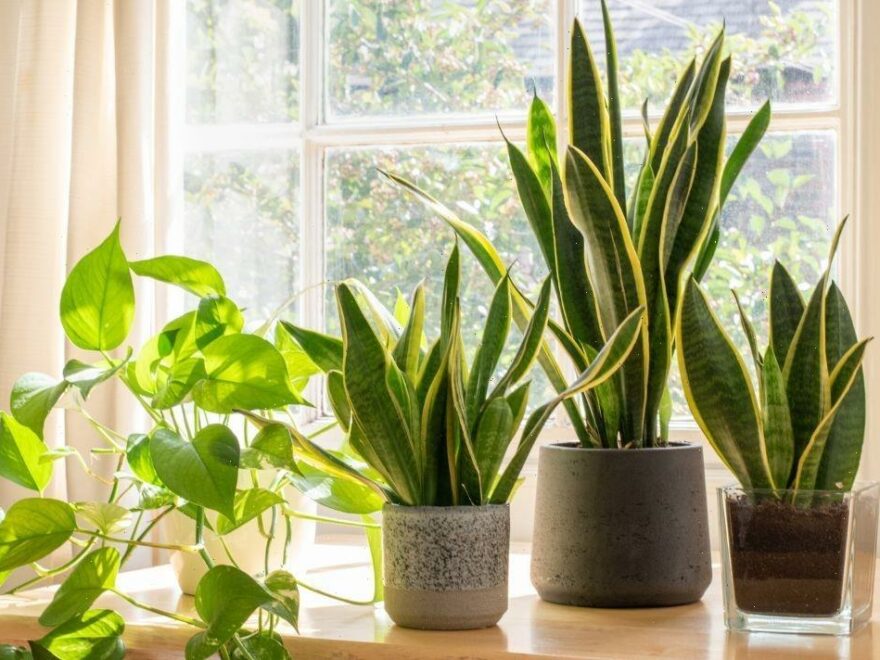Gardening: Expert reveals air purifying houseplants
We use your sign-up to provide content in ways you’ve consented to and to improve our understanding of you. This may include adverts from us and 3rd parties based on our understanding. You can unsubscribe at any time. More info
According to recent research made by industry experts at Direct2Florist, over 42,000 internet users in the UK have been searching for “houseplants” over the last month alone. Houseplants can purify the air inside homes, improve sleep quality as well as help prevent mould, a common problem in the winter months. Wendy Rea, an expert florist and manager at Direct2Florist, has shared the best plants to choose this winter.
The expert said: “Snake plants are a natural air purifier and are known to remove harmful chemicals from our homes. These plants are so easy to care for as they will thrive in any space.
“You can place them in any desired space around the home and they will remain fresh and healthy during duller winter seasons.”
This houseplant purifies the air by absorbing toxins through the leaves and producing pure oxygen. Some experts recommend putting the snake plant in the bedroom due to these factors.
They are also great at removing plenty of other harmful chemicals such as xylene, trichloroethylene, toluene, benzene and formaldehyde.

The florist added: “Spider plants also purify the indoor space and increase humidity in the air by evaporating water from their roots through their long leaves.
“Their thick roots mean they don’t need to be watered consistently, so spider plants are the ideal choice, especially if you are forgetful and want something low maintenance.”
They are extremely fast growing and easily propagated so you can produce a whole new family of plants from just one spider plant.
A study by NASA found that spider plants were able to remove 95 percent of chemicals from the air in just 24 hours, including filtering carbon monoxide.
DON’T MISS:
‘Extremely cost-efficient’ method of keeping your home warm [COMMENT]
I cleaned my hob with a product which claims to remove ‘100%’ of dirt [INSIGHT]
‘Simple’ strategic furniture placement hack to stay warm at home [EXPLAINER]
Plants also have other great benefits including reducing the risk of mould in the home. According to the expert, peace lilies are a great houseplant for those who have the common problem.
Wendy explained: “Peace lilies also remove toxins from the air and prevent a build-up of mould and mildew around the home. Their beautiful leaves make them a perfect choice to fresh up and brighten our indoor space in the darker, colder months.
“Peace lilies prefer indirect sunlight, so keep them away from windows to keep them from drying out and make them last longer.”
This houseplant has a natural ability to absorb mould spores from the air so it should be placed in areas where mould is most likely to occur.

The florist continued: “Orchids are a great addition to places we go to relax in the home, such as the bedroom or living room, as their benefits help relieve stress and boost relaxation, counter depression and anxiety levels.
“They also improve focus by improving the air quality, so are beneficial to introduce to a workspace. Orchids require a little more care than other plants and need to be watered regularly, once a week is ideal.
“They need to be placed in an environment with a stable temperature, so it’s best to keep them away from windows and radiators.”
Orchids can help to reduce humidity in the home, getting all their nutrients and moisture from the air around them. What’s more, they don’t need a very big pot to grow in, making them ideal for small spaces.

This houseplant is available in a variety of different colours and it is often very easy to tell when there is a problem with an orchid seeing as its roots grow out of the pot, instead of down.
If you have more than one orchid, they may benefit from being grouped together because this helps to raise the humidity amongst the plants.
Chris Bonnett from GardeningExpress.co.uk said: “Mould in the home is caused by excess humidity.
“Warm rooms, like bathrooms and kitchens, are at particular risk. Using plants to help keep mould at bay is a practical and natural way to control humidity and moisture in your home.
“How good a plant is at reducing humidity is all to do with its ability to absorb dew, fog and other moisture through its leaves. This moisture then moves down to its roots. You’ll notice an improvement – and you’ll have beautiful plants to enjoy too.”
Source: Read Full Article
